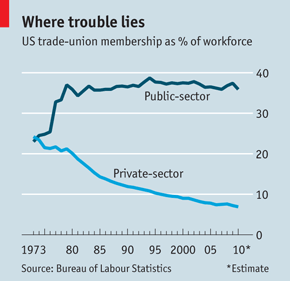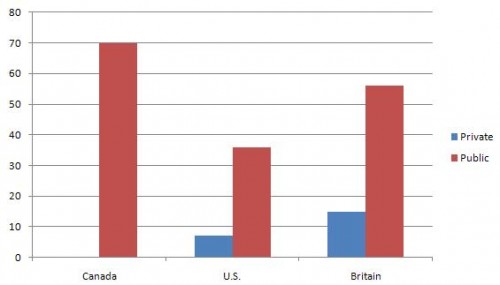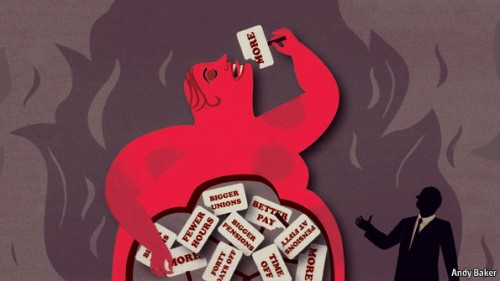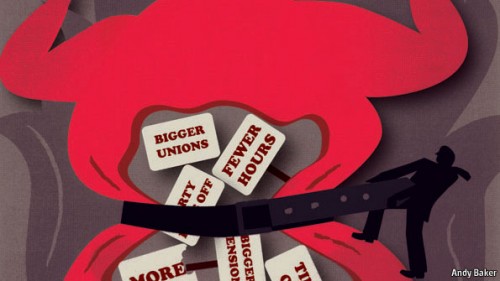Laura Heron sent in a article from the Economist about changes in union membership. The article, which takes a fairly negative view of the effects of unionization, includes a graph, titled “Where trouble lies,” that illustrates how much union membership has shifted from the private to the public sector in the U.S. Today, 36% of public employees (7.6 million) are members of a union, while only about 7% of employees of private companies (7.1 million) are:
Such a change, from primarily private-sector and often blue-collar workers to government employees, many of whom will be white-collar, middle-class, and relatively highly educated, has significant consequences for employers, governments, employees, and the issues likely to be of primary concern to the labor movement more broadly.
I used the data given in the article to create a chart comparing the percent of private- and public-sector employees in unions in Canada, the U.S., and Britain “today” (by which I assume they mean 2010, though they don’t specify, so be cautious there; also, they didn’t provide the private-sector rate for Canada, so I just used the data I had):
Aside from that, Laura’s attention was drawn to the post partially by the way labor was represented. To make sure we don’t miss the fact that unions are “trouble,” they illustrate the story with this image depicting labor as a fat, ravenous, naked figure devouring resources from the trim man in business attire:
A subsection of the article is also titled “Fattening the Leviathan,” and as the image at the end of the article makes clear, we need to cut this monster down to size:
It’s sort of the mirror image of the “fat cat” rhetoric often used to depict the wealthy as greedy individuals who gorge themselves on profits at the expense of workers. In either case, the central element that makes such rhetoric work is the perception of fat people as lazy, ravenous, greedy individuals who take more than their fair share of available resources.





Comments 44
Frowner — January 13, 2011
As a member of a public sector union, I find it ridiculous that the wealthy audience for the Economist would like me to work in conditions that they themselves would find totally unacceptable--they'd like to see my sick time slashed, my vacation slashed, my job security taken away (and who ever hears of a CEO without a golden parachute?), my (actually lower than private sector) pay frozen or reduced and --god knows--my good-quality health insurance destroyed. Like many people in public sector unions, I took a job that paid less than I could make in the private sector precisely because I wanted good benefits and a union to protect me.
No upper class person would expect to work for anything but plenty of money and decent conditions--if they don't get fancy benefits, they expect high pay to make up for it. And how many CEOs trash a company and then go right on to another fancy job? How many senior administrators of trusts, universities and hospitals do exactly the same thing?
Of course, this is all about labor discipline and disaster capitalism. These rich creeps are taking the opportunity of a recession to attack the benefits that American workers have managed to retain, so that when the good times come back again they won't need to pay for health care or retirement and their profits will be higher.
It makes me so sad that non-unionized Americans, who so desperately need non-stagnant wages, vacation hours and decent health care, are getting swoggled by claims that because they are being exploited by their bosses, I am the problem. I can see a doctor when I'm sick. I can see a dentist. I get two weeks of paid vacation plus paid sick days, instead of two weeks of vacation/sickday PTO. I pay a chunk of my wages into the pension plan--and I'd gladly pay more if needed to keep the plan solvent, just as I gladly pay into Social Security to guarantee some retirement money. Everyone should have those things, and everyone can have them, or we can have a society with a few rich people and a lot of poor ones.
Ryan — January 13, 2011
Funny how you can't help but frame this is a class issue: rich people read the Economist, you are middle class and rely on your unionized wages. No comment except that it's beside the point.
Everything is a tradeoff in business, so when Unions demand higher wages and more benefits, a business becomes productive. That doesn't mean there should be no Unions but that a balance must be struck between two values (productivity and workers' benefits and security). The problem is that in the private sector, business owners will fight much harder for "their side" of the balance because IF they can't afford their workers' wages, they'll go out of business. In the public sector, the "company" won't go under no matter what, so workers can perpetually demand more benefits without the fear that it'll cost them their company. Economists, businesspeople, and "The Economist" see this ever decreasing productivity as a Bad Thing, an Unchecked Balance. That's what the article is about. Thanks for the deconstruction of the article image but it's not like you're shining a new light on their opinion.
Am I explaining the obvious? I ain't got no econ degree.
Ryan — January 13, 2011
That top paragraph was a reply to Frowner.
Ryan — January 13, 2011
I meant to say in the first sentence of the next paragraph, *less productive. I need to be careful on keyboards today...!
larrycwilson — January 13, 2011
Perhaps the perspective of the taxpayer should be examined.
pg — January 13, 2011
How long has it taken for the USA perception of unions as made up of patriotic, hardworking citizens to morph into this? 30 years? 40? It has come with the shift of domestically produced products and the pride in buying things "Made in the USA" to outsourced sweatshop production that lowers cost and raises profits for the richest segment of the country. The segment that owns the companies and can build factories in other countries. Countries which don't require expensive frills like OSHA, safe working conditions, minimum wages, and health insurance.
Try finding anything "Made in the USA." There is no web site you can go to that lists such products. There aren't any products to list!
Diana — January 13, 2011
The problem is that most unions (especially union leaders!) are more concerned about getting benefits than actually having their members do their jobs. Think about some of the most prestigious jobs in the US -- doctors, startup CEOs, scientists. You think those residents get good vacation time? 40 hour workweeks? That is a joke - all of those people put in a lot more time.
Most non-union employees work much more than 40 hours and that is because 40 hours is ridiculously low. If we, as a society, think that 40 hours is "an acceptable working week" we shouldn't be surprised when people from India and China become much more successful in "our country."
Gotta say, I agree with the economist.
Diana — January 14, 2011
Please - don't turn this into a personal attack.
The "entitlement" of union employees just baffles me - for example a quote I found from a California (my state) union employee:
"I work for a county in California. We were asked to modify our contract last year-2009 by deferring our C.O.L. raise until July of 2010. We were told at the time that we would receive our 2009 C.O.L. along with the one due in 2010. In any case we voted to not defer last year-the county then said that many people were mis-informed re:the issues and we were asked to vote again (after the CAO of the county threatened lay offs and the end of flexible schedules). In any case 2010 rolls around and we again were asked to defer-so we were due a 3.25% raise from 2009 and and a 2.75% raise already scheduled for 2010."
Oh.okay. So this person was "Due" a 3.25% raise in 2009? and 2.75% in 2010? At the same time, others are getting laid off and taking pay cuts - this person thinks that s/he is special enough to get raises?
I believe in a lot (not all, but a lot) of what the unions work for (affordable healthcare being super important) HOWEVER, these sorts of goals should not be "just" for unionized employees. In a perfect world, there should be NO unions, and good rights for ALL employees.
Jeffrey — January 14, 2011
I think the word "due" in this situation you present, Diana, means the promises that were made by a company to its employees.
Employees are held to the account of management and ownership, unfortunately, without the force of union it does not operate in the other direction. This is not an accident or a 'natural' state of business.
A. Helin — January 14, 2011
I thought I'd give the union issue some international perspective. Nordic countries have unionization rates of well over 80, even 90 percent across the board, in both private and public sectors. Some fields approach 100% unionization. The central union organizations are strong players in the job sector, looking after jealously for the salaries and benefits of their employees and providing services like legal aid and discounted insurance.
The central organizations between the employees and employers also negotiate annual rates of pay raises, to offset the impact of inflation. Often the government also takes part in these negotiations, and might compensate for a mutually agreed lower rate of pay rises by lowering income taxes.
Another commenter mentioned how "in a perfect world, there would be no unions" - I think the best realistic approach is having as many people as possible be in a union, so that the union has enough power without resorting to questionable methods, yet there's enough oversight because of the size of the organization.
The unions are seen as the counter-weight to the corporations and employers, and an important component of the Nordic welfare state. I personally think the whole social democratic model is indebted to the unions and the socialist movement. From this point of view, the American perspective on unions sticks out to me in these aspects:
1) Even though we like to call ourselves jealous, the union topic seems to draw out an amazing amount of jealousy from Americans. Apparently, if your neighbour has a better pay and more vacation because of his union job, somehow this is bad, and makes you want him to lose his benefits, as opposed to seeking to unionize yourself to make things better for yourself. This line of thinking is utterly baffling.
2) The wide-spread demonization of unions. I think there are three components to this. One, I'm sure some unions in the US are connected to organized crime; this is because unions have been vilified for over a century, and have been suppressed violently on many occasions (railroad riots of the late 1800s, miners riots, Haymarket massacre, etc). I can see how people who wish to organize in their self-interest might turn to illicit means and ways when the ostensibly legal society cracks down on them. Two, the media is strongly biased against unions because they are dominated by corporate owners, and the reporters seek to pander to them. I'd also suppose the right-wing narrative of unions is being echoed in the media strongly. Three, the unions = communism equation, Cold War and McCarthyism.
3) Anecdotal bias. This was already brought up, with how anti-union people often resort to anecdotes that don't seem to match up with statistics or reality. Another facet of this is again in the media, and news items like "Abusive teacher not sacked because of his union". This is because the union's job is to look after the legal interests of its members and to make sure everything goes by the book. This means that an employee might be suspended before sacking to actually investigate the complaint against them, instead of firing them immediately. This in turn leads to negative headlines. (On a tangent, this seems to be related to the demonization of lawyers and suspects' legal rights in TV police procedurals.)
A. Helin — January 14, 2011
Another thing - I think some of the bad rap unions get in the US is borne out of the catastrophic condition the public education system is in. Teachers are strongly unionized and look after their rights, with issues like salary, qualifications and class sizes. With the education sector facing serious cutbacks and other threats, it's easy for politicians, especially right-wing politicians, to blame the unions for the ails of the school system, instead of looking at systemic causes like poverty and underfunding.
I do have the impression that the teachers' unions in the US might be even stronger than their equivalents in the Nordic countries, but they need to be so because of the dismal conditions they have to work in. For example, Finland mandates by law the amount of school children you can cram into one class - in the US, this seems to be regulated by unions instead.
muke — January 14, 2011
I like the implications that the "business" character is rational, rightfully in control, and being deprived of what is rightfully his, as if the interests, or even rights of the people working for him are one mass of imposing gluttony. He just has to stop nasty labor from eating all his picket signs.
nix — January 14, 2011
I'm glad you picked up on the fatphobia - something that often goes unquestioned in this kind of visual rhetoric.
Frowner — January 14, 2011
I know I'm overposting in this thread (last comment!) but:
1. Unions are negotiating bodies. That means that when the employer says "no raises for the next three years!", the union comes right back with "we demand our 3.5 percent!" The goal is to negotiate a settlement. You don't win a negotiation by going up to the other party and saying "I'd like to meet all your demands" For instance, here at Large University, the administration wanted no pay cuts for senior staff, two weeks of unpaid furlough for union members and a bunch of other concessions. The union worked with sympathetic senior staff and organized its members, and we got fewer furlough days, a partial wage freeze and some reductions in senior administration pay. Most people here, while not thrilled about the wage freeze and the furlough days, are willing to do what it takes -- if everyone pitches in.
The take-away: pointing to a union and saying "but they don't want to give up any benefits--how selfish!" is a misunderstanding of how unions work.
Also--a strike is a last resort. No one--trust me on this--wants to strike. Strikes are awful. They're only awesome and romantic when you're not doing them, and very few unions are full of people just itching to walk off the job.
2. Large University does treat people in the professional/administrative job class worse, in some ways, than the folks in the union. (That's because they don't have a union!) Many of those folks make more money (but not all of them) and have fancier titles, but their jobs aren't as safe--the stories from my P&A friends about screwed up bosses and bad work environments would curl your hair.
If you are being treated badly or underpaid, that is on your boss. It's not on me. If I get paid overtime and my usual workweek is forty hours but you have to work weekends every week for no extra money (like some P&A folks I know who don't actually make much more than me), that is not the fault of my union. That is the fault of your boss, squeezing cost savings out of you by getting an extra forty hours a month for free.
3. Unions--god knows--aren't perfect. I'm not actually the biggest fan of my union. I totally believe that there are people who are incompetent who receive union protection when they probably shouldn't-- but then there's the boss's friend who can't be fired, or the creepy sexual harasser who makes bank for the investment firm, etc etc. I've worked plenty of non-union jobs with incompetent or crooked people who never got disciplined. And I've worked two jobs with spectacularly abusive bosses against whom the employees had no recourse.
People always point to failure or corruption in a union as if it means that there should be no unions, but very few people point to failure or corruption within the church, the school system, the banking system or government (far more corrupt than unions!) and says that we shouldn't have those things. Only when average working people get together to secure decent wages and benefits does this logic come into play.
TL:DR - I'm totally down with people who hate their union, or people who find some things about unions (boring rhetoric! awkward conversations with your boss when you like your boss! letting projects you care about stop when you're on strike!) annoying. But that's not the same as being against unionization or denying its society-wide benefits.
Unions, The Public And The Economy « The Edit: WFPL's Gabe Bullard blogs the news — January 14, 2011
[...] Sociological Images says this about the shift in union makeup. Such a change, from primarily private-sector and often blue-collar workers to government employees, many of whom will be white-collar, middle-class, and relatively highly educated, has significant consequences for employers, governments, employees, and the issues likely to be of primary concern to the labor movement more broadly. [...]
Wred — January 16, 2011
So let me get this clear... the Economist is portraying unions as gluttonous benefits-devourers, while the chart they provide shows declining private sector union membership and stagnant public sector union membership? Why is this issue being portrayed at a problem? It seems to me that capitalism is winning, and the phrase "Where the problem lies" looks like it wants to create a moral panic where none is remotely justified.
That being said, the mythological ideal worker who has no interests or time constraints outside of work, who enjoys only driving to the office/job site, working as long as human physiology allows, and driving to a spartan home again, is both deeply problematic in what it says about capitalism's demands on human lives, and brutally gender-biased against women. By way of explanation for the former: Capitalism writ large does not benefit its participants, and actively harms their engagement with the wide realm of possible activities in life. By way of explanation for the latter, women are often seen as less preferable workers because they do unpleasant things like birth children, have an assumed domestic houseworkload, and use/have emotions.
e w — January 20, 2011
There should be no union representation for people choosing to work in public-sector jobs that supporting the vulnerable: children, the elderly, the mentally ill, etc.
Discuss. (Or flame me.) :)
e w — January 22, 2011
Some people see this as a worker issue, and I see it as an issue about the people receiving services. If the point of some of my taxpayer dollars is to protect the very vulnerable, like abused kids, as the morally ethical thing to do as well as the best way to control future costs, then one way to prevent that from being possible is to have a million rules about getting a break when you want it instead of when it's convenient. The union mindset is fine when it's worker versus fat cat, but not when it's worker versus someone with no power (a homeless child). My state's department of children and families has unions in place for people hunting down parents who abuse their children--it hamstrings their ability to do their jobs and puts kids at risk. Unions are not necessary in those situations. Union for coal miners? ABSOLUTELY. Unions for State child protection workers? Absolutely not.
Ron Johnson — January 8, 2013
If government is so great and is the answer to all of our problems, then why are public sector unions needed?